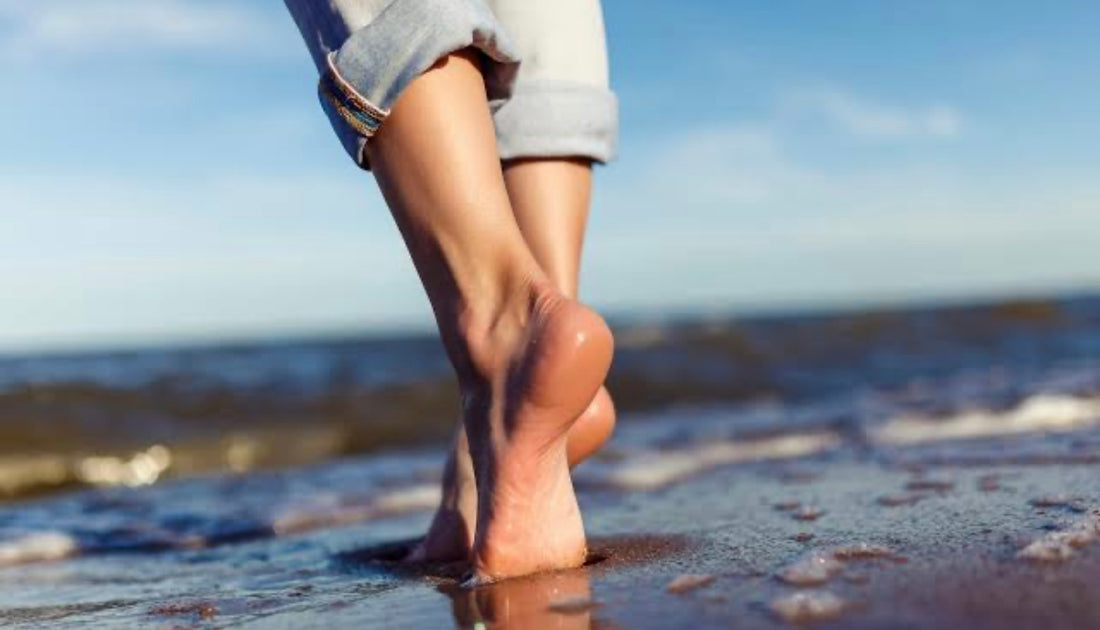According to orthopaedic professionals walking barefoot restores our natural gait, and the padding and structure of shoes can, over time, prevent us from using certain muscle groups that can strengthen the body. Walking without shoes can improve balance, help with pain relief and lead to improved mechanics of hips, knees and core.
Barefoot walking on the other hand, also known as grounding, or earthing, has evolved from a pursuit of the open-minded to a scientific-research practice with a number of recognized health advantages.
Our ancestors evolved in close connection with the earth’s energy. We walked barefoot. We slept on the ground. We benefitted from the Earth’s healing natural healing energy. Today, so much of our time is spent insulated from this grounding energy, in shoes, in our cars and indoors.
Earth carries a negative charge and when we make a physical connection with the earth, through earthing, we discharge that excess energy, which in turn is said to have a healing effect at a cellular level. The simplest form of earthing involves barefoot walking on the grass, in dirt or on sand.
Why Barefoot Walk
More recently, inflammation has been widely recognised as the leading trigger of chronic pain and many major health disorders from cardiovascular disease, diabetes and arthritis to some forms of cancer. Inflammation is a reaction of our immune system to intruders – bacteria, viruses and foreign bodies such as pollen and air pollutants.
When we make a connection with the Earth, when we ground through barefoot walking, there has been found to be a reduction in white blood cells and an increase in red blood cells, which hints to better immunity. Barefoot walking has been shown to help increase antioxidants, reduce inflammation and improve sleep.

What are the benefits of walking barefoot?
Why is Grounding Important? In our modern lifestyle, we are often surrounded by electronic devices, electromagnetic fields, and concrete environments that can disrupt our natural electrical balance. Grounding offers a way to restore this balance and promote physical and emotional well-being. Here are some key reasons why grounding is important:
- Reduces Inflammation: Grounding has been shown to have anti-inflammatory effects on the body. By neutralizing free radicals and reducing oxidative stress, grounding can help alleviate chronic inflammation, which is linked to various health conditions.
- Improves Sleep Quality: Grounding has a calming effect on the nervous system, helping to reduce stress and promote relaxation. This can result in improved sleep quality, allowing for more restorative rest.
- Enhances Energy and Vitality: By rebalancing the body’s electrical charge, grounding can increase energy levels and vitality. It helps to restore a natural flow of energy, allowing for improved physical and mental performance.
- Boosts Mood and Reduces Stress: Grounding has been found to increase levels of serotonin, a neurotransmitter associated with mood regulation. It can also help reduce cortisol levels, the hormone released in response to stress, promoting a sense of calm and well-being.
- Supports Immune Function: Chronic stress and inflammation can weaken the immune system. Grounding helps regulate stress hormones and reduce inflammation, thereby supporting a healthy immune response

Go barefoot
Grounding is an ancient practice in which the body is directly connected to the earth's surface and experiences electrical conduction due to the Earth's natural negative electric charge. Putting the body in this state is believed to lead to physical effects— and possible health benefits—such as improved sleep, altered immune function, reduction in inflammation, improved mood, reduced pain and soreness, and more.
This festive seasons lose your shoes and socks and connect with the earth - dirt, grass or sand - making sure your bare skin connects with the earth. Enjoy the feeling of grounding with the earth, release negative energy and restore your balance, mood and general health.


